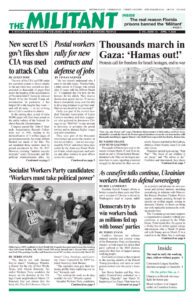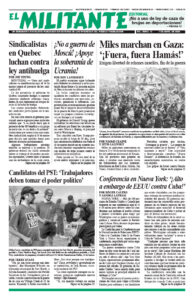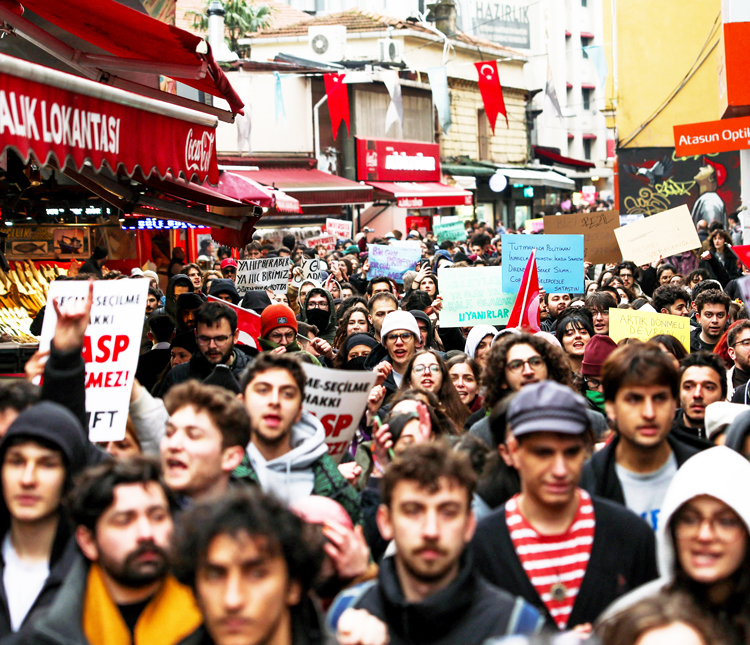Substantial protests are growing across Turkey, after the government of President Recep Tayyip Erdogan arrested Istanbul Mayor Ekrem Imamoglu, his most prominent political rival, March 19. The crackdown marks an attempt by Erdogan to shore up his hold on power amid economic and political turmoil in the region and as he maneuvers to advance the interests of Turkey’s capitalist rulers in today’s disintegrating imperialist world order.
Imamoglu was detained just days before he was set to be named the presidential candidate of the Republican People’s Party (CHP). Last year the CHP, the main secular opposition party to Erdogan’s Islamist-based Justice and Development Party, won a majority of the vote in municipal elections nationwide. This was the strongest challenge to Erdogan’s political domination since he became prime minister in 2003.
Imamoglu and 105 others, including a number of municipal officials, were charged with corruption as well as aiding a “terrorist organization.” The latter charge is based on CHP coordination with the pro-Kurdish Peoples’ Equality and Democracy Party in some districts in the 2024 municipal elections.
CHP leader Ozgur Ozel said the arrest of Imamoglu was a “coup attempt,” and called for mass protests. The Istanbul provincial governor, an Erdogan appointee, ordered a four-day ban on public gatherings and closed key streets and subway stops in Turkey’s largest city. Nevertheless, daily protests have taken place outside the Istanbul City Hall, swelling to hundreds of thousands.
Actions spread to at least half of Turkey’s provinces, despite further government bans, including in the capital Ankara and in Izmir, Turkey’s third-largest city. Police have attacked some demonstrations with tear gas and rubber bullets, and arrested over 1,400 people, including journalists, as of March 25.
Union leaders and members have joined the protests and condemned the arrests. The government is “using illegal methods against political opponents,” said a March 19 statement by the president of the Confederation of Progressive Trade Unions of Turkey. “Journalists, union leaders and artists are also under attack. The goal is to silence the whole nation.”
In December, Erdogan banned metal workers from striking for 60 days in the name of “national security.” Workers at a number of factories struck anyway, winning pay raises, the United Metalworkers’ Union reported.
Inflation in Turkey topped 44% last year, according to Erdogan’s government statistics. Other estimates are significantly higher. The central bank spent a record $11.5 billion March 19 to prop up Turkey’s currency after it plunged on news of Imamoglu’s arrest.
Seeks to advance Ankara’s interests
Erdogan’s clampdown on opposition comes as Turkey’s capitalist rulers seek to carve out a more stable place as a regional power. The Turkish rulers have the second-largest military in NATO, but also maintain ties to Moscow.
They’re looking to advance their interests as alliances shift in a capitalist world in turmoil. The region is in upheaval, with Tehran, Hezbollah and Hamas taking serious blows after their murderous pogrom against Jews in Israel and the following war, and the fall of the hated Bashar al-Assad regime in Syria.
The most intractable challenge the regime faces comes from the substantial Kurdish population in Turkey and surrounding countries who have battled for their national rights for decades. There are 30 million Kurds spread across Turkey, Iran, Iraq and Syria — the largest oppressed nationality without their own state in the world.
For months the government has carried out negotiations with Abdullah Ocalan, the decadeslong imprisoned leader of the Kurdistan Workers’ Party (PKK), on ending the armed conflict that has killed some 40,000 people over the last four decades. On March 1 the PKK agreed to an immediate ceasefire, and said Ocalan’s prison conditions must be eased. The government’s response was to demand the immediate and unconditional dissolution of the Kurdish party. The Turkish army continues to carry out attacks in Kurdish areas.
They are also intervening in Syria, seeking to deepen relations with the new Islamist government while stepping up attacks on the semi-autonomous Kurdish region there on the border with Turkey.


